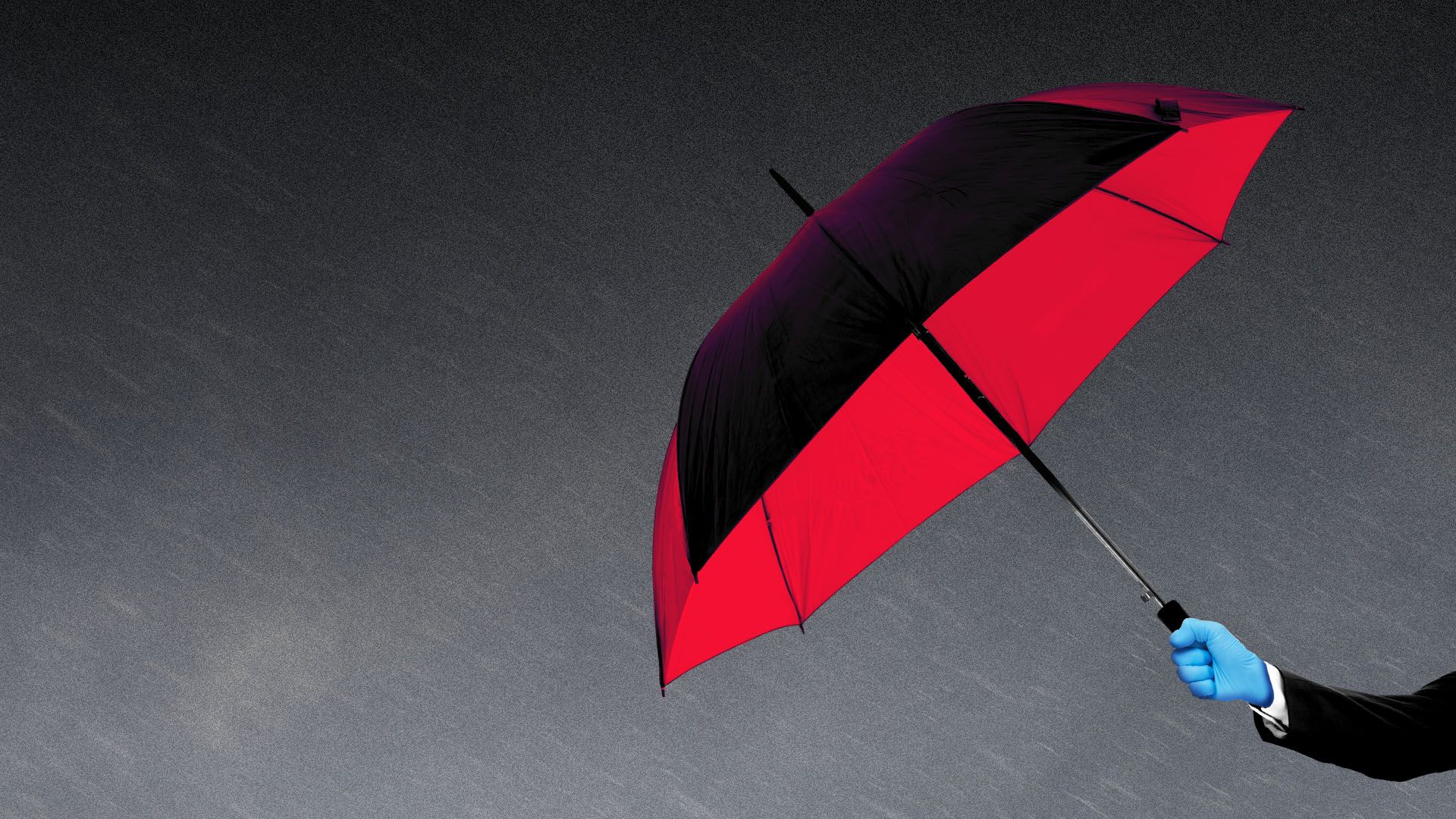Exclusive: FEMA braces for COVID-infected hurricane season
Add Axios as your preferred source to
see more of our stories on Google.

Illustration: Sarah Grillo/Axios
Pete Gaynor, who runs the Federal Emergency Management Agency, is drafting a document whose title sounds like the stuff of horror movies: "COVID-19 Pandemic Operational Guidance for the 2020 Hurricane Season."
Driving the news: "We're doing a lot of things that are not necessarily in any playbook that has existed," Gaynor told me in an interview on Saturday. "In some cases, we write the playbook as we go."
Behind the scenes: In preparing for the June 1 start of the Atlantic hurricane season, Gaynor must consider challenges beyond what predecessors have faced:
- How do you evacuate people from hurricane zones while maintaining 6 feet of social distancing?
- How much extra shelter space will be needed to house people who can no longer safely crowd into schools, auditoriums and community centers?
- How do you protect the most vulnerable people such as the elderly and those with underlying conditions?
- Resources already are strained — and so are tensions between many governors and the Trump administration.
The big picture: It's the first time ever that every U.S. state and territory has simultaneously declared a major disaster.
- "This pandemic, it is historic, it is unprecedented in many ways for FEMA," Gaynor said.
One nightmarish prospect: "If we have to evacuate a hospital, that hospital typically would just evacuate the patients," Gaynor said. "But now we've got to make sure they evacuate the patients, the medical equipment like ventilators, pharmaceuticals that allow ventilators to be used on patients in ICUs. All those things now make it more difficult, there's no doubt about it."
- Natural disasters like floods may mean hospitals have to transfer patients sick with COVID-19 to other facilities that will take them.
- "Locals and states really have to understand some of those challenges and plan for that," Gaynor said, adding that FEMA will try to help.
Why it matters: It's not hyperbolic to say that we could face the most dangerous combination of disaster threats in American history this summer.
- As Hurricane Katrina tragically proved, one bad hurricane can overwhelm the federal government.
- This year, early forecasts indicate that the Atlantic hurricane season may be worse than usual.
- Wildfire season is approaching.
- Earthquakes and floods are always a threat.
- Even if the pandemic subsides over the summer, experts say it may resurge in a second wave as autumn nears — while hurricane season runs through Nov. 30.
Despite all this, Gaynor said he's "highly confident" FEMA can manage this unprecedented summer.
What's next: Gaynor says FEMA is preparing for the worst.
- The agency has taken over vacant office space in downtown Washington, D.C., and set up an additional command center — called a "surge" National Response Coordination Center — for staff across the government to handle the non-COVID catastrophes threatening America this summer.
- FEMA has ordered 100,000 "human remains pouches" (also known as body bags) that Gaynor hopes he won't need.
Between the lines: Gaynor has to manage all of this at a time when government resources and workers — not to mention the supply of personal protective equipment — are strained to the extreme. And he will need federal-state cooperation at a time when some governors are so mistrustful of the feds that they say they're hiding their PPE stockpiles in secure undisclosed locations so the federal government won't seize them.
- Several governors, including Colorado's Jared Polis (D) and Massachusetts' Charlie Baker (R), have accused the federal government of diverting their supplies of critical equipment to fight COVID-19, including masks and ventilators.
- Maryland Gov. Larry Hogan (R) was using the Maryland National Guard to protect thousands of coronavirus tests he got for his state from South Korea.
- When I asked him about this, Gaynor flatly denied the governors' charges.
- Earlier Sunday, Hogan said on CNN's "State of the Union" that “I'm not sure it's necessary at this point" to keep guarding the tests. "There had been several reports of shipments being intercepted or diverted by the federal government" from other governors and "we wanted to make sure that that didn't happen," but FEMA and his state are "all working together. So, we're — it's not a concern any longer."
FEMA's press secretary Lizzie Litzow added in a statement: "FEMA does not, has not and will not divert orders of personal protective equipment (PPE) from our federal, state and local partners, nor do we have the legal authority to do so. Reports of FEMA commandeering or re-routing such supplies are false."
- "If a hospital believes this has happened to them, it should be reported to the governor. If a governor believes that this has happened to their supplies, it should be reported to the FEMA Region."
The bottom line: Gaynor is encouraging communities to prepare early — to download the FEMA app, which provides preparedness tips, disaster resources and localized weather alerts. And to check out FEMA's disaster preparedness campaign — ready.gov — and its coronavirus page, fema.gov/coronavirus.
